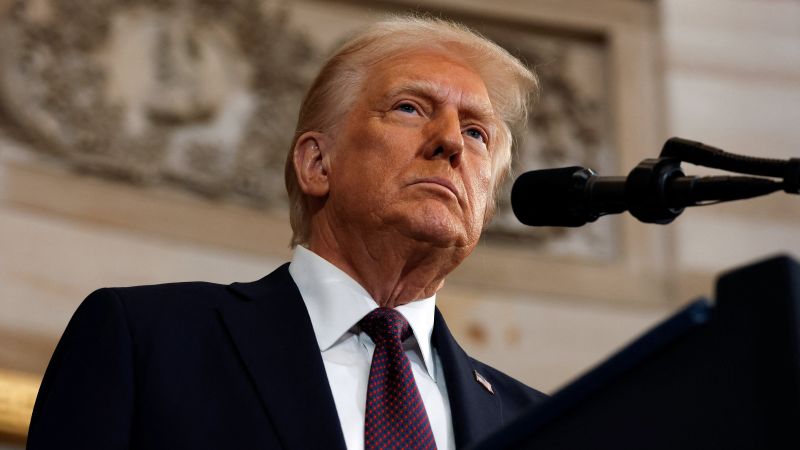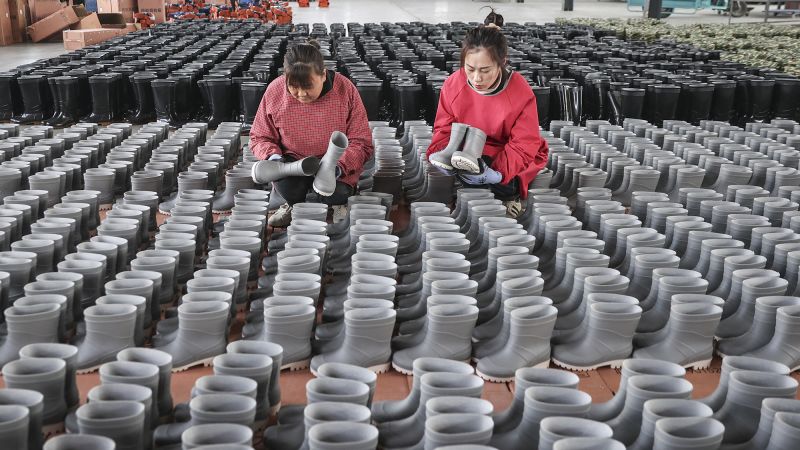—
President Donald Trump is expected to outline his trade policy for his second term in an executive action Monday. But that action – described by sources as a “placeholder” – won’t institute new global tariffs that Trump has promised would raise trillions of dollars.
The placeholder action comes as Trump’s economic team has been meeting regularly to chart a path to implement the steep, sweeping tariffs on allies and adversaries alike that the president promised on the campaign trail.
Although administration officials continue to debate how to make good on his pledges, Trump in his inaugural address made clear he still plans to make significant changes on tariff policy – in one form or another.
“I will immediately begin the overhaul of our trade system to protect American workers and families,” Trump said in his speech in the US Capitol Rotunda Monday. “Instead of taxing our citizens to enrich other countries, we will tariff and tax foreign countries to enrich our citizens.”
Trump also said in his address he would establish a new government office called “the External Revenue Service,” which will be tasked with collecting tariff revenue.
“It will be massive amounts of money pouring into our Treasury coming from foreign sources,” Trump said.
But how to do that remains an active question that has split Trump’s economic team. Among some alternative ideas proposed: smaller tariffs that grow in amount over time, or tariffs that don’t take effect for several months, giving the administration time to get counterparties to the negotiating table.
Also under discussion: what legal basis to use to back up the tariffs, especially with countries and companies affected by them likely to sue. Advisers are weighing using emergency powers, which would give the president broad authority to regulate imports.
Market-minded officials like Scott Bessent, Trump’s pick for Treasury secretary, and Kevin Hassett, his pick to lead the National Economic Council, have advocated for a softer approach. Tariff champions such as Peter Navarro, a White House trade adviser, and Howard Lutnick, Trump’s pick to lead the Commerce Department, have argued the full bore is needed to send the message Trump wants.
Trump, for his part, has been calling allies on Capitol Hill to shore up support for tariffs. But the specific policy has yet to be decided.
Trump’s policy could have significant effects
As a candidate, Trump proposed sweeping and across-the-board tariffs: up to 20% on imports from all countries, with a 25% tax on goods from Mexico and Canada, plus a punishing 60% levy on goods from China. He also pledged to use tariffs as a negotiating tool on other countries, including, for example, Denmark – putting pressure on the European nation to give control of Greenland to the United States.
But those tariffs could raise costs for Americans who are weary from years of high inflation. Tariffs are paid by American companies that import foreign goods, but those costs typically get passed on to consumers in the form of higher prices.
Despite assurances from Trump that foreign countries will pay the tariffs – not America’s consumers, new research from the Peterson Institute for International Economics suggests the opposite: Trump’s aggressive tariff campaign will force American consumers to pay more for practically everything – from foreign-made sneakers and toys to food.
Trump’s tariffs would raise prices particularly on imported electrical devices, toys and sporting goods, Peterson found. And businesses will be subject to new taxes to import transportation equipment, chemicals and other items.
Proponents of Trump’s tariff plan argue that the import taxes will be used strategically to further America’s interests in the world, saving American consumers in the long run. Trump in his first term threatened tariffs several times only to dial back his threats when foreign countries came to the negotiating table.
But most mainstream economists fear Trump’s tariffs could reignite America’s inflation crisis, spooking the stock market and sparking a full-blown trade war. US tariffs often invite retaliation from other countries. During Trump’s first term, everything from US autos and soybeans to whiskey were targeted with retaliatory tariffs.
The ideological debate taking place among Trump’s economic team is reminiscent of his first term, when Steven Mnuchin and Gary Cohn — Wall Street alums serving atop Treasury and the National Economic Council, respectively — led a vocal charge to halt or dilute the tariffs Trump was proposing, fearful of retaliation and recession.
Back then, discussions continued for more than a year before the administration announced its intentions to levy tariffs as part of a national security investigation.
Despite numerous reports that Trump may pare back his tariff policy this term, he has consistently claimed that he will make good on his campaign pledges. Both things may ultimately be true: The devil will be in the details.
CNN’s Matt Egan contributed to this report.



